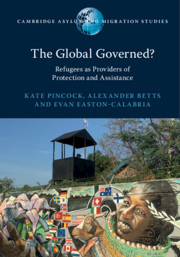4 - Nakivale
Published online by Cambridge University Press: 06 March 2020
Summary
In Nakivale, the institutional context can be characterised as ‘co-optation’. Many refugees accuse UNHCR and its implementing partners (IPs) of ‘stealing’ their better ideas. Some IPs have justified independently pursuing ideas generated with refugees on the grounds of the limited capacity or competence of RCOs. UNHCR’s limited faith in the capacity of RCOs means that there are few opportunities for RCOs to work with them or their partners beyond being arbitrarily included in events or activities organised by formal providers. This chapter explores how the reaction of refugees to this distrust has been a mutual ‘scepticism’: they lack confidence in the formal organisational structures and thus often disengage. Many community leaders are reluctant to register their CBOs or to work collaboratively with UNHCR and its implementing partners when opportunities do arise. Where possible, RCOs prefer to retain their independence rather than risk their ideas being ‘stolen’ by IPs and used as evidence for their commitment to community-led development in order to attract further international funding.
- Type
- Chapter
- Information
- The Global Governed?Refugees as Providers of Protection and Assistance, pp. 53 - 69Publisher: Cambridge University PressPrint publication year: 2020

